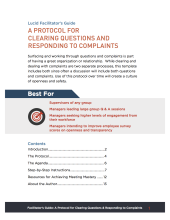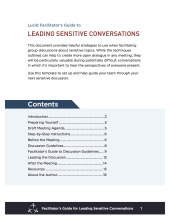You can find an introduction to Issue Resolution Meetings in Chapter 31 of Where the Action Is. These resources will help you plan, run, and troubleshoot the specific Issue Resolution Meetings your team needs.
Definition
An Issue Resolution Meeting is used when two parties both recognize there is a problem to solve, but they have different beliefs about how the problem should be solved.
Questions Answered
- Given that we do not agree on what to do next,
- can we find a mutually satisfactory way to move forward?
Examples
- Support Team Escalation
- Conflict Resolution
- Contract Negotiations and Renewals
- Neighborhood Dispute
Purpose
- To reach a new agreement or reconciliation.
- To secure commitment to further the relationship.
Work Outcomes
- An agreement (ideally).
- Clarity on what happens next.
Human Outcomes
- Closure.
Meeting Agenda Templates and Guides
How to Handle Complaints and QuestionsPaul Axtell - Surfacing and working through questions and complaints is key to growing and sustaining a great organization (or personal relationship). While clearing questions and dealing with complaints are two separate processes, this meeting agenda template covers both since often a discussion will surface each equally. Any... [ more ] |
|
How to Lead a Sensitive ConversationDr. Patricia Thompson - Use the helpful strategies in this meeting agenda template to facilitate group discussions about sensitive topics. While the techniques outlined can help to create more open dialogue in any meeting, they will be particularly valuable during potentially difficult conversations in which it’s important to hear the... [ more ] |
Recommended Reading & Resources
Articles
- When Surprise Is a Good Negotiation Tactic by Roi Ben-Yehuda and Tania Luna for Harvard Business Review
Glossary of Meeting Terms
Technique
Appreciative Inquiry techniques seek to build on the positive outcomes, successes, and highlights in a situation instead of focusing on how to counteract negative forces. Practitioners recognize that people are...

